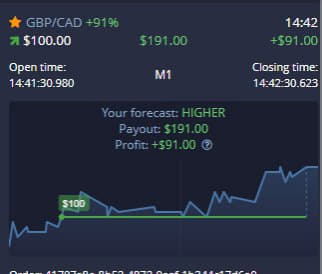The 6 Pieces Of Jewellery Any Man Can Wear 30.jpg
If you're new to options trading, you may be wondering how those trades are taxed Pocket Option Stratejisi Yeni Başlayanlar Ticaret . Here's a rundown of some potential tax pitfalls with options strategies.
Which trading is best for beginners? Copy trading, also known as social trading or mirror trading, is a strategy that allows beginners to participate in financial markets by emulating the trades of experienced investors.
Is Pocket Option good for beginners? User-friendly platform: The Pocket Option platform is intuitive and easy to navigate, making it accessible for both beginner and experienced traders. Competitive payouts: Pocket Option offers competitive payouts, with some trades offering up to 95% returns on successful trades.
Want to trade options? Be sure you understand the tax implications first. Here are some basic things to consider when it comes to buying and selling these contracts on the open market:
Introduction The 6 Pieces Of Jewellery Any Man Can Wear 30.jpg
 IRS terminology doesn't always match the language used within the financial industry Pocket Option Live Chart . For example, some people who consider themselves to be "traders" (aka day traders or active traders) are more likely to be considered "investors" by the IRS.
IRS terminology doesn't always match the language used within the financial industry Pocket Option Live Chart . For example, some people who consider themselves to be "traders" (aka day traders or active traders) are more likely to be considered "investors" by the IRS.
To be considered a trader by the IRS one must be in the "business of trading," which basically means trading is your day job. Those in the "business of trading" might want to consider meeting with a tax professional and reading IRS publication 550 and IRS Topic No. 429 Traders in Securities.)
For tax purposes, options can be classified into three main categories:
1. Employee stock options
These are generally options contracts given to employees as a form of compensation and aren't traded on the open market. There are two primary types: non-qualified stock options and incentive stock options.
Generally, the gains from exercising non-qualified stock options are treated as ordinary income, whereas gains from an incentive stock option can be treated either as ordinary income or can be taxed at a preferential rate, if certain requirements are met. To learn more about employee stock options, see How Should Equity Compensation Fit Into Your Financial Plan.
2. Equity options
These are options contracts on equities that can be traded on the open market. Puts or calls on individual stocks or ETFs that hold stocks are some examples.
How they're taxed depends on whether you have a long position (where you're the buyer of the option) or a short position (where you're the seller/writer of the option). The table below provides an overview, but be aware that if you're doing more complex options transactions, such as spreads or butterflies, the IRS may apply different tax rules (see below for more details).
Long options
- Long Options (buy)
- If you close the position before expiration
- If you exercise the option
- If the option expires